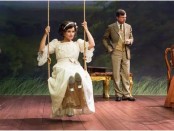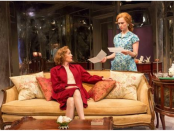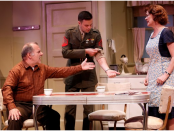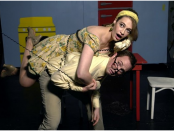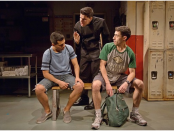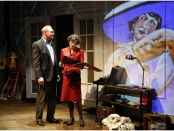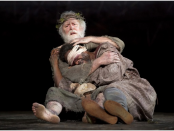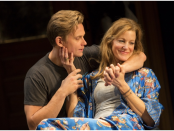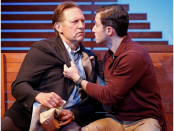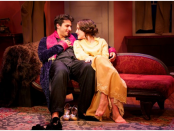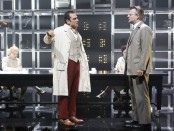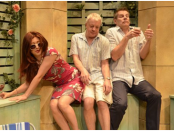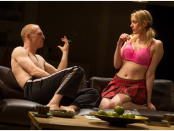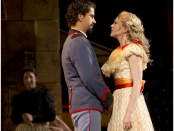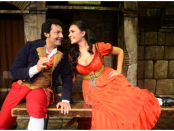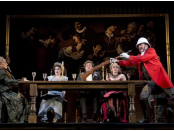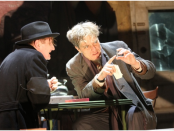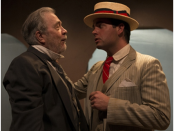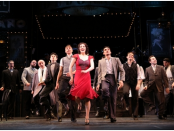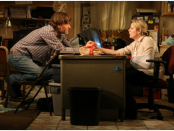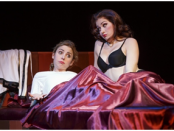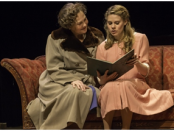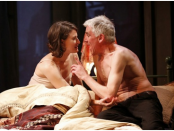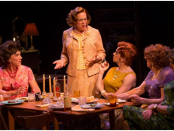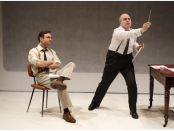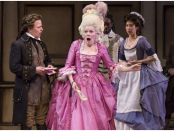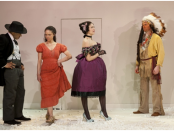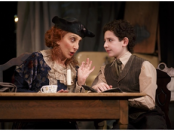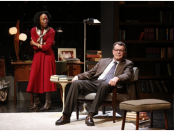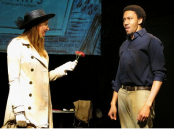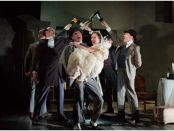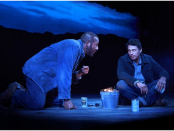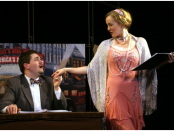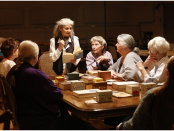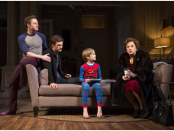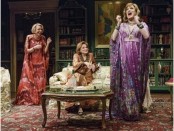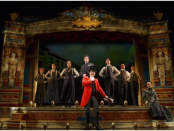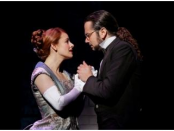Articles by Victor Gluck, Editor-in-Chief
Under Gregory Mosher's subtle and assured direction, the two performers always seem age appropriate to their characters. While they do nothing to disguise their real ages, it is as though two older people have gotten together to review the letters that they have written to each other over a lifetime. [more]
Uncle Vanya
Aside from his light touch which keeps the play from seeming gloomy, Brooks has an uneasy hold on the play's rhythms which seem erratic – we are never sure what kind of play we are watching. Schmidt's translation goes a long way to blowing off the cobwebs on Chekhov's 19th century Tsarist Russia but his occasional use of a contemporary word like "freak" draws attention to itself. While Simms' unit set suggests a summer retreat with its green walls covered with vegetation, he makes little distinction between indoors and outdoors and the claustrophobia which the characters are feeling is never real to the audience. [more]
The Fatal Weakness
Kristin Griffith and Victoria Mack in a scene from The Fatal Weakness (Photo credit: Richard [more]
Almost Home
Almost Home Joe Lisi, Jonny Orsini and Karen Ziemba in a scene from Almost Home (Photo [more]
The Power of Love: Two New Operatic Musicals
it was almost entirely slow music, and over 90 minutes of it, something which might give even a Wagnerian pause. This is billed as a new piece, so perhaps it's not too late to suggest that the authors consider some discreet compression, as the opera might benefit from judicious cuts. It takes perhaps half an hour to read the original story, and its brevity is one reason for its effectiveness; but this was more than three times that length, though the original Hawthorne plot has been only very slightly expanded. [more]
The Valley of Astonishment
Jared McNeill and Kathryn Hunter in a scene from The Valley of Astonishment [more]
My Mañana Comes
José Joaquín Pérez and Jason Bowen in a scene from My Mañana Comes (Photo credit: [more]
Culture Shock: 1911-1922
The framing device is that we are in a bunker or a trench, and the plays are being presented by five soldiers (De Mussa, Wes Hager, Will Hardyman, Wilton Yeung, Josh Wolonick) and a nurse (Joyce Laoagan), as if whiling away the time between barrages, and in a semi-improvised fashion. This is a good idea, and provides a nice unity to the evening. The scenic design (Joseph Kremer) and lighting design (Daniel B. Barbee) supported this well, too. There were also projections and pre-recorded music tracks, which I assume should be credited to multimedia programmer Aristides F. Li.
[more]
Bauer
The relatively unfamiliar cast of this West Coast production could not be better. Howard is distinguished and forceful as the once-famous artist now reduced to nothing and aching for a fight with his greatest enemy; Ross is imperious and elegant as the once-powerful curator used to always having her way, now seeking out her greatest love. Their scenes together strike fireworks. [more]
Poor Behavior
Katie Kreisler and Brian Avers in a scene from Poor Behavior (Photo credit: James Leynse) [more]
King Lear
While Sullivan does not seem to have turned his company into a coherent ensemble, the production is always easy to understand and unambiguous. The diction is always clear, though at times the sound design by Acme Sound Design seems to be at the wrong level. King Lear is a difficult play to bring off with its unrelieved outsized tragedy, and using actors not practiced in interpreting Shakespearean roles may not be the best casting. It is also possible that the production will achieve greater depth as the performers have more onstage time. This is a King Lear more than a little disappointing from such a talented group of theater artists. [more]
Sex with Strangers
The casting is superb. Gunn expresses Olivia's vulnerability and integrity with every line and moment of the play. Magnussen's Ethan, on the other hand, exudes arrogance and over-confidence having found easy success early in his life both with women and as a writer. it also takes perfect casting and acting to make such an evening both convincing and absorbing. This Gunn, Magnussen and Director David Schwimmer have accomplished in spades. Sex with Strangers is an evening not to be missed. [more]
Summer Shorts: Series B
Jack Hofsiss, the Tony Award-winning director of The Elephant Man, keeps the acting reined in while the dialogue becomes more and more blasphemous. Veteran actress Brenda Currin makes the discontented Mother Superior a believable character but the other four performers seem to be asked to posture rather than put any faith in their roles. [more]
Strictly Dishonorable
Travis Chinick's costumes are period perfect for the tail end of the Jazz Age while Liz Scherrier's two sets suitably set the mood for both the main room of the speakeasy and the bachelor apartment above. Beth Lake's sound design includes snatches of tenor arias as well as pertinent outside noises. [more]
Summer Shorts 2014: Series A
Warren Leight's "Sec. 310, Row D, Seats 5 and 6" is the most ambitious of the three plays as it attempts to cover 20 years in the lives of three friends who share a two-seats subscription at Madison Square Garden for the Knicks games. "Riverbed" deals with the loss of a child by married couple Adam and Megan in a freak drowning accident. The theme of men's friendships when they are away from their women is also evident in the curtain raiser, Roger Hedden's "The Sky and The Limit." [more]
The Pianist of Willesden Lane
The excellent sound design by Erik Carstensen was crucial to the success of the show. The presentation benefits greatly from well-selected projections by Andrew Wilder and Greg Sowizdrzal. [more]
Atomic
The creation of the atomic bomb and the ethical questions raised by its use on Japan to end World War II would seem a strange topic to turn into a song and dance show. However, Atomic, a new musical which had a successful run in Sydney, Australia, now having its American premiere with an Off Broadway engagement, has an urgency about it that few musicals ever achieve. [more]
Wikimusical
This show is not good, and that however much their acquaintances may enjoy the performance this is not going to appeal to anyone else. [more]
Picture Ourselves in Latvia
Playwright Ross Howard gives us a locked-ward play. Set in a psychiatric hospital, we meet three long-term residents, their orderly, a nurse, and a doctor. The patients' maladies are not specified. Mostly they seem merely simple, with mental ages of between roughly five and eleven, so it's not clear why they're in hospital rather than some sort of group home. Martin (Christopher Daftsios) in particular seems an innocent; Anna (Dana Benningfield), a recent emigrant from Latvia, is a bit paranoid; Duncan (Andy Nogasky) is intelligent but awkward like an early adolescent, and struggles with hydrophobia. [more]
Donogoo
What the production does have is a ravishing scenic design made up of colorful and witty projections (sometimes animated) by Roger Hanna & Price Johnston for the play's 23 tableaux, moving from Paris to Marseilles, Saigon, San Francisco, Rio de Janeiro, & mythical Brazilian city of Donogoo-Tonka. [more]
Ayckbourn Ensemble
Part of the fun of the Brits Off Broadway Festival at 59E59 Theaters each June are the new plays that Sir Alan Ayckbourn sends us periodically with the original casts from his Stephen Joseph Theatre, Scarborough, England. This year he has sent us three running in repertory – two new plays in their world premiere productions (Arrivals &Departures and Farcicals: A Double Bill of Frivolous Comedies) and a revival of his 1992 Time of My Life, making its New York debut. [more]
The Tender Land
Strongest in the cast were Ms. Brittingham as Laurie and Mr. Fredericks as Grandpa. Some of the other singers were defeated by the church acoustics, and director Lynne Hayden-Findlay did what she could with the impossibly tiny playing area. Conductor Samuel McCoy kept everything running smoothly and the ensemble sounded well. [more]
The Village Bike
A very visceral play, The Village Bike is not for prudes; on the other hand, it should open a conversation that is long overdue in our theater concerning men and women's sexuality as it is understood today. [more]
Much Ado About Nothing
While Jack O'Brien's production of Much Ado About Nothing is in no way definitive, it is tremendous fun. His strength here as a director is that his 20 person ensemble has become a true community, one that lives and loves together, one we can believe gets involved in each other's problems and joys. [more]
Gertrude Stein Saints!
The music is much like that of their models. Songs improvised in garages, fields, or vacant lots are often short on harmonic and melodic sophistication, but this is mitigated by rhythmic subtlety, verbal dexterity, and, most importantly, brevity. No segment lasts long enough to become boring. [more]
Rugantino
The cast is full of terrific comedians, most of whom are well-established television and movie stars back in Italy--at least three or four received entrance applause. Watching Brignano in the lead (who is seldom offstage for long) was like watching Sid Caesar in his prime. But they're not especially great singers, and that's a bit of a problem. The music is obviously beloved by the Italian audience, which applauded in recognition at the beginning of the Act 1 finale, "Roma, Non Fa La Stupida Stasera," but the quality of the music was curiously divided. The instrumental interludes were vivid and colorful, with interesting harmonies and melodic turns. [more]
Editor’s Notes: 2014 Tonys Wrapup
Broadway had its big night when the 68th Annual Tony Awards, presented by The Broadway League and the American Theatre Wing, were given out at Radio City Music Hall hosted by the genial and charming Hugh Jackman for the fourth time. One of several of the evening's surprises was the four minute opening number in which Jackman hopped from the street to the stage to backstage and back on stage again, recreating Bobby Van's iconic number from the 1953 MGM musical, Small Town Girl, which went unidentified in the course of the evening. [more]
The Killer
Much of the work of the play is left to the smoke and lights added by the designers but these elements fail to create mood on TFANA's stage. Matthew Richards' lighting is suitable without becoming a real character in the play even when the scenes are performed on a bare stage. The off-stage noises created by sound designer Jane Shaw don't go far enough as Ionesco intended them to fill the stage with the off-stage crowds, locales and events that we don't see. [more]
Quintet of the Americas: “Wind Chamber Music from 1983-2014 by Roberto Sierra”
Last was the gem of the concert, Sierra's new Sexteto para piano y vientos in its first performance anywhere. This piece is a concertino in three movements, and often the winds become an extension of the piano, sustaining and elaborating its lines and motifs. [more]
Within the Law
What is the most famous play currently running in New York that you have probably never heard of before? Bayard Veiller's Within the Law, Metropolitan Playhouse's final entry in its "Justice" season, has been filmed six times since its Broadway debut in 1912, most famously as Paid with Joan Crawford, revived once on the main stem, and still packs quite a punch. [more]
Irma La Douce
Alas, by intermission many in the audience were asking each other: this was a Broadway smash? From Encores! we have come to expect Champagne, and this was a dreary vin ordinaire, a bit pale and a bit stale. [more]
The City of Conversation
The City of Conversation is very rewarding theater whatever your political persuasion may be. The use of the social and political climate of the last 30 years is astutely delineated and always part of the fabric of the play, rather than a history lesson. [more]
The Few
Gideon Glick as Matthew is terrific, physically disappearing into his character so completely that he would not be recognizable in the street. Actors can get away with playing misfits as a collection of tics, so it's a great thing to see Glick dig deeper and infuse Matthew's every movement with his particular personality. [more]
Under My Skin
Under My Skin with its 20 scenes and endless set changes (designed by Stephen Dobay) is lame in the humor department and has nothing new to say about the healthcare system. Had director Kirsten Sanderson toned down the exaggerated acting style, some of the material might have worked. [more]
Editor’s Notes: The 2014 Tony Season Heats Up
his year's Tony Awards will go to the music hall murder mystery, A Gentleman's Guide to Love & Murder (Best Musical) and All the Way, Pulitzer Prize winner Robert Schenkkan's LBJ play, All the Way (Best Play). [more]
A Loss of Roses
While Dan Wackerman's production is always absorbing, the muddled psychology in the script and the debatable choices made by the actors keep the play from joining Inge's more important major plays. [more]
Sea Marks
Gardner McKay's Sea Marks is beautifully written but leaves a great deal up to the actors and the director as does a scenario for an opera or a ballet. The performers must flesh out the underpinnings of the story. Director Ciarán O'Reilly has done a fine job with the characterizations but has not brought out the passion that underlies the tale. [more]
Casa Valentina
Harvey Fierstein's Casa Valentina is absorbing theater both as a revealing look into a world unknown to most theatergoers as well as a suspenseful new story. If the play has a flaw, it is that its message is a little bit obscure [more]
The Love Song of Alfred J Hitchcock
The trouble with British playwright David Rudkin's stage play, "The Love Song of Alfred J Hitchcock," is that it started life as a radio play and it hasn't escaped very far from the radio studio. Still a play for voices, Rudkin's script has a great many introspective monologues by the iconic director but not much action, a strange choice for a story of a director whose movies are loaded with incident. The play assumes a great in-depth knowledge of the director's work: such movies as "Marnie," "Vertigo," "Strangers on a Train," "Psycho," "The Birds" and "Frenzy" are referred to tangentially but remain unnamed. It would take a film historian to track down all the references but apparently the play is expected to stand on its own which will confuse many theatergoers. [more]
The Rivals
The Pearl Theatre Company's revival of Richard Brinsley Sheridan's 1777 comedy of manners "The Rivals" is both laugh-out-loud funny and intellectually stimulating. Hal Brooks' exemplary direction scores immediately in the first scene. It's a typical pre-modern opening, pages of dense exposition where a couple of minor characters discuss the major characters and their situations. Brooks avoids tedium and confusion by having the characters appear upstage when named, doing a bit of dumb show when appropriate. It's a perfect solution, introducing the actors and plot without fuss, without anachronism, and without wasting time. [more]
An Octoroon
Provocative playwright Branden Jacobs-Jenkins turns Boucicault’s 1859 classic inside out as he examines 2014 attitudes about race in U.S. [more]
Act One
James Lapine's stage adaptation of Moss Hart's celebrated autobiography of his early years, Act One, is a bit unwieldy at under three hours in length as it does contain so many characters and incidents. However, like an absorbing mini-series you have lived with over a period of time, you will be sorry when it is over. [more]
The Substance of Fire
Time has caught up with Jon Robin Baitz’s 1991 play and bankrupting one’s company over issues of integrity no longer seems quite admirable. Jon Robin Baitz writes literate, thoughtful plays like his 2012 Pulitzer Prize finalist, Other Desert Cities. However, like the revival last fall of his earliest play The Film Society showed, plays may date badly or their attitudes become artifacts of another generation. [more]
Violet
An interesting and touching early musical from the composer of "Shrek," "Caroline, or Change," and "Fun Home." It may be in keeping with the notional scar, but sometimes "minimalist" fades into "generic." An inherent problem with the show, it's possible that even a small Broadway house like this one (740 seats) will always be too big.
The climactic sequence, following Violet's discouraging experience in Tulsa, takes place mostly in Violet's head and as such is almost unstagable, and in any case hard to understand. Last and most problematic is that these soldiers react relatively casually to Violet's allegedly repellent deformity. [more]
To Damascus, Part I
The director deserves high marks for keeping the actors' delivery quick and light; anything else would have put the audience to sleep. His cast comes across as sincere but mostly inexperienced, with the fine exceptions of James and Blankenship. [more]
The Threepenny Opera
The most famous songs (covered by many artists) continue to be "Ballad of Mack the Knife" and "Pirate Jennie." Although uncredited, the orchestrations appear to be Kurt Weill's own as they were in the 1954 Blitzstein/Theatre de Lys production. While the seven-piece orchestra under the direction of Fred Lassen is generally fine, occasionally the music seems too slow for Weill's jazzy rhythms. As to the musical numbers in the Blitzstein version, there has been some rearrangement. The "Barbara Song" originally sung by Lucy Brown has been reassigned to Polly Peachum. As a result, in order to give Lucy a song of her own, "Ballad of the Drowned Girl" from the Weill/Brecht Berlin Requiem (in an orchestration by music director Gary S. Fagin) has been interpolated into the score. [more]
The Realistic Joneses
The Realistic Joneses introduces a new American playwright to Broadway, one with a unique voice all his own. Whether main stem audiences will understand Will Eno's cadences is another question. Toni Collette, Michael C. Hall, Tracy Letts and Marisa Tomei give the play a fine patina of urbanity. This, however, is not a play for all theatergoers. With its slightly mocking title (as these are anything but realistic Joneses), it is for those who want to be challenged and who want something new.
[more]
Of Mice and Men
As the African American hand banished to the stable, Ron Cephas Jones alternates movingly between bitterness with his lot and his desperate loneliness. Jim Parrack brings a great sense of fairness and moral integrity to the role of Slim, the only member of this tight, little community to whom they all instinctively look up to. Receiving third billing, Leighton Meester (star of television's Gossip Girl) as Curley's wife, the only woman in the play in this man's world, is caught in the trap of playing either Madonna or whore, typical of 1930's Hollywood movies. [more]
America’s Sweetheart
Jennifer Evans as French bombshell Denise Torel lights up the stage every time she appears. Her French accent is straight from Paris and she has a cunning way with a song. As the second bananas Madge and Larry, Molly Pope (of cabaret fame) and Thom Caska (aka associate producer for the StrawHat Auditions) turn their confrontations and shenanigans into stand-up comedy at which they are quite adept. Michael Mahany and Laurie Hymes as rising stars Michael and Geraldine bring a great deal of conviction to these leading roles, though Hymes' lisp disappears each time each she starts to sing. [more]
A Raisin in the Sun
The play tells the story of the hard-working black Younger family living in a shabby two-room apartment on Chicago's South Side, sometime between World War II and 1960. The patriarch, Walter Lee, Sr. has died recently and the family is awaiting a $10,000 insurance check (about $88,000 today) which is due to arrive in a day or two. Each of them looks forward to using the money for a different purpose [more]
I Remember Mama
Director Jack Cummings III has not only chosen a new environment for this realistic play, he has also chosen to perform it with ten veteran actresses (who would be classified as senior citizens) playing all 23 parts, including teenage girls and boys, and all the male characters. When the audience enters the Gym at Judson the entire space has been turned into the playing area with seats in two rows around all four walls. Ten dining room sets with displays on each occupy the space, the size of a basketball court. [more]
Mothers and Sons
Tyne Daly has made it a specialty playing unsympathetic and difficult women, for example her star turns as Mama Rose in Gypsy and Maria Callas in Terrence McNally’s Master Class. Now in a new McNally play, Mothers and Sons, she plays the bitter, angry, taciturn Katherine Gerard, the Andre’s mother of McNally’s earlier one act. [more]
The Tribute Artist
A rich elderly lady is held captive in her posh townhouse by distant relatives and a former lover all out for her wealth. [more]
A Gentleman’s Guide to Love & Murder
Alexander Dodge's Edwardian sets which appear inside a reproduction of Pollock's Toy Theater are always delightful. Linda Cho has created an enchanting collection of costumes from those for all of Mays' transformations into the D'Ysquiths to the women's lovely and seductive gowns. The amusing projection design is the work of Aaron Rhyne. Jonathan Tunick's melodic orchestrations are always faithful to its Edwardian period and its music hall roots. Credit director Tresnjak, artistic director of Hartford Stage, now making his Broadway debut, with keeping this confection airborne throughout the evening, including when stretching credulity to the limit. [more]
Jekyll & Hyde
Director/choreographer Jeff Calhoun does not seem to have trusted the material or wanted this production to be as different as possible from the original Broadway staging. While much of this Jekyll & Hyde is handled as caricature, the sets by Tobin Ost in garish red and black with their walls at steep angles resemble nothing so much as a color version of The Cabinet of Dr. Caligari, without the expressionist weight of that story. [more]
Mary Poppins
The musical has inspired many to learn how to sing. The magic comes from Bob Crowley's breathtaking sets and costumes aided by David Benken's technical direction: Mary Poppins flies in and out on her umbrella, people pop out of chimneys, toys become human, birds fly around the theater, and statues break their poses and move. The opening scrim is a blue pen and ink illustration which suggests the world of the P.L. Travers' stories on the printed page. The Banks' house at 17 Cherry Tree Lane, London, is a giant Victorian doll house come to life. Crowley uses brilliant colors in both his costumes and the fantasy sequences to replace the animation that made the Walt Disney film so attractive. [more]


